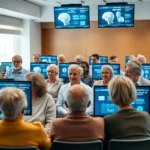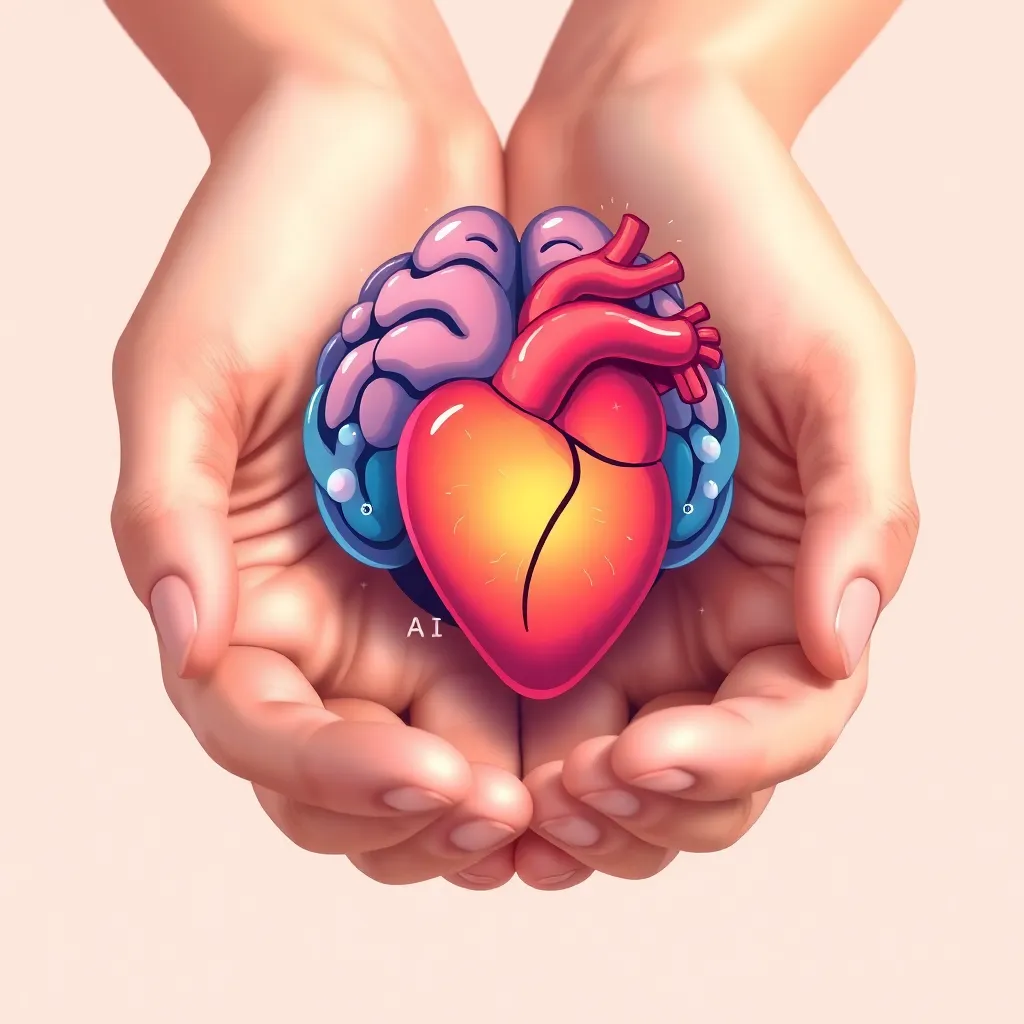The Surprising Journey of Mental Health and AI
From Stigma to Internet Profit Success

Let’s take a stroll down memory lane. Not the kind where you forget why you went into the kitchen, but the kind that reveals how Mental Health Awareness Week and the curious world of artificial intelligence have become unlikely allies. If you’re a retiree or approaching that golden era, you might be wondering how these two topics could possibly help you outlive your income. Buckle up. This is a story of hope, humor, and a dash of internet profit success.
Mental Health Awareness Week. Where Did It All Begin?
Back in 2001, when flip phones were all the rage and streaming meant something you did with a fishing rod, the UK’s Mental Health Foundation had a bold idea. They launched the first Mental Health Awareness Week, with the theme “Friendship and Mental Health”. The goal? Get people talking about mental health, tackle stigma, and encourage everyone to prioritize their well-being.
It wasn’t always this way. Before the millennium, mental health was often swept under the rug. If you talked about feeling anxious, someone might hand you a biscuit and change the subject. But the Foundation, building on decades of advocacy since 1949, decided enough was enough. They wanted mental health to be as much a part of public conversation as the weather.
So, every May, millions across the UK, schools, workplaces, celebrities, and retirees alike, dive into activities, discussions, and fundraising. The week has grown into the UK’s biggest mental health campaign, sparking policy changes and giving charities a much-needed boost.
How Mental Health Awareness Week Has Evolved
The early days were all about breaking the silence. Over time, the focus shifted to prevention and practical steps for well-being. Each year brings a new theme. In 2024, it’s “Moving more for mental health”, a gentle nudge to get off the couch, even if it’s just to chase the cat out of your favorite chair.
But the week isn’t just about feeling good. It’s about making real change. It’s kept mental health at the center of public conversation, influenced government policy, and, most importantly, made it okay to say, “I’m not okay”.
Mental Health and AI. An Unlikely Friendship
Now, let’s fast-forward to today. Artificial intelligence is everywhere. It’s in your phone, your fridge, and probably your neighbor’s new car that parks itself. But what does AI have to do with mental health? More than you might think.
AI is stepping up as a powerful tool in the mental health arena. It’s not just about chatbots that tell you a joke (though those can help). AI can:
Spot early signs of mental health issues by analyzing speech and behavior patterns
Offer judgment-free, 24-7 support through apps and virtual therapists
Help professionals diagnose and monitor conditions more accurately
A recent study found that three-quarters of people said AI helped their mental health at work. It provided information, automated boring tasks, and even helped prioritize what needed to be done. Most surprisingly, many preferred talking to AI about stress rather than their manager, no awkward small talk required.
AI Influencers and Mental Health. The Digital Cheerleaders
Enter the world of AI influencers. Yes, you read that right. These are digital personalities designed to promote positive mental health messages on social media. Unlike human influencers, AI never gets tired, never has a bad hair day, and never accidentally posts a photo of their lunch instead of an inspirational quote.

AI influencers can:
Share consistent, stigma-busting messages
Scale their reach across platforms, from Instagram to TikTok
Engage younger audiences who might roll their eyes at traditional campaigns
Offer hope, practical tips, and even stories of “their” own struggles (crafted by clever programmers)
For retirees, this means you can find support and information in friendly, accessible formats, no need to decipher cryptic hashtags or keep up with the latest viral dance.
Affiliate Marketing. Turning Passion into Internet Profit Success

Now, let’s talk about something that makes every retiree’s ears perk up, income. Specifically, how can you use your life experience, a bit of tech, and the growing mental health movement to create a new stream of income? Welcome to the world of affiliate marketing.
Affiliate marketing is simple. You promote a product or service online. If someone buys through your referral, you earn a commission. It’s like recommending your favorite book to a friend, but instead of a thank-you note, you get paid.
Why is this especially juicy for retirees?
Flexibility: Work when you want, where you want. Your living room, your garden, or even the local café.
Purpose: Stay engaged, share your wisdom, and help others while earning extra cash.
Low barrier to entry: No need for a tech degree. If you can send an email, you can start affiliate marketing.
And with the explosion of mental health products and apps, online therapy, wellness gadgets, the opportunities are endless.
Mental Health and AI. The Affiliate Marketing Goldmine
Here’s where mental health and AI join forces for your benefit. The mental health industry is booming. By 2027, mental health apps alone are expected to be worth over $10 billion globally. Many of these apps and services have affiliate programs. That means you can promote them and earn a tidy commission.

But wait, there’s more. AI is making affiliate marketing easier and more profitable:
Automated content creation: AI tools can write blog posts, create social media updates, and even suggest catchy headlines.
Ad optimization: AI analyzes what works and tweaks your campaigns for better results, while you enjoy a cup of tea.
Targeted engagement: AI helps you understand your audience, so you recommend products that truly help them.
If you’re passionate about mental health, you can build a community, share valuable resources, and earn income, all from the comfort of your favorite armchair.
How Retirees Can Get Started. A Step-by-Step Guide
So, how do you dive into this world of mental health and AI-powered affiliate marketing? Here’s a simple roadmap:
1. Choose Your Niche
Focus on mental health topics that resonate with you. Maybe you’ve overcome anxiety, or you’re passionate about mindfulness. Your story matters.
2. Find Reputable Affiliate Programs
Look for mental health apps, online therapy platforms, or wellness products with good reviews and solid reputations.
3. Upskill Yourself
Don’t worry, you don’t need to become a tech wizard. There are plenty of resources to help you learn the basics of affiliate marketing and using AI tools.
4. Create Content
Share your experiences, tips, and product recommendations through blog posts, emails, or social media. AI can help you with writing, editing, and even graphic design.
5. Engage Your Audience
Respond to comments, ask questions, and build relationships. People trust real stories and genuine advice.
6. Track Your Results
Use AI-powered analytics to see what’s working. Tweak your approach for better results, and bigger commissions.
Mental Health and AI. Busting Myths and Embracing Opportunities
Let’s address a few common concerns:
Is AI going to replace human therapists? Not likely. AI is a tool, not a replacement. It can support professionals and make help more accessible, but human empathy still matters.
Is affiliate marketing a get-rich-quick scheme? Nope. It takes effort, learning, and patience. But it’s a real opportunity to supplement your income and stay engaged.
Can retirees really succeed at this? Absolutely. Your life experience, empathy, and wisdom are your biggest assets. Plus, you have the time to learn and grow at your own pace.
Mental Health and AI. Real Life Success Stories
Let’s sprinkle in a few inspiring tales. One retiree, after years in education, started a blog about mindfulness and aging. She partnered with a popular meditation app, shared her journey, and soon found herself earning enough to fund her gardening hobby. Another retiree, passionate about men’s mental health, used AI tools to create engaging newsletters and saw his online community, and his bank account grow steadily.
The best part? These retirees didn’t need to be tech geniuses. They just needed curiosity, a willingness to learn, and a desire to help others.
The Future. Mental Health, AI, and Your Retirement

The world is changing fast. Mental health is finally getting the attention it deserves. AI is making life easier and opening new doors. And affiliate marketing is giving retirees a way to stay active, purposeful, and financially secure.
Imagine a future where you:
Use AI to manage your retirement finances, automate budgeting, and get tailored investment advice.
Share your mental health journey online, helping others while earning income.
Build a community that values openness, support, and well-being.
This isn’t science fiction. It’s happening right now. And you can be part of
Tips for Internet Profit Success in Mental Health and AI
Start small. Pick one product or service you believe in.
Use AI tools to save time and boost creativity.
Be authentic. Your audience values honesty over hype.
Stay informed. Mental health and AI are evolving fast, so keep learning.
Celebrate your wins. Every new follower, every commission, every thank-you message is a victory.
A Final Word. Embrace the Adventure
Mental Health Awareness Week started as a way to break the silence. Today, it’s a movement that’s changing lives. With AI and affiliate marketing, you can be part of this change, while securing your own financial future.
So, whether you’re a retired teacher, a former accountant, or simply someone who cares, there’s a place for you in this story. The tools are at your fingertips. The need is real. And the rewards go far beyond money.
Ready to embark on your own journey of mental health and AI-powered internet profit success? The world is waiting. And your story is just beginning.
“AI can simplify retirement finances by automating budgeting, forecasting cash flow, and managing investments with adaptive algorithms.”
“Mental health affiliate programs serve as a golden ticket in affiliate marketing, providing a unique chance for people to support mental health while simultaneously earning cash benefits.”
“AI influencers never tire or waver, enabling persistent mental health advocacy.”
Mental Health and AI. The Retirement Revolution
To sum it up, Mental Health Awareness Week has come a long way, from a small campaign to a national movement. AI is transforming how we support mental health and manage our finances. Affiliate marketing offers retirees a new path to purpose and income.
It’s never too late to start. Whether you want to help others, earn extra money, or simply keep your mind sharp, the world of mental health and AI is open to you. And who knows? Your next chapter might just be your most rewarding yet.
Stay curious, stay connected, and remember, your experience is your superpower. Use it to make a difference, for yourself and for others. Here’s to mental health, AI, and a retirement filled with purpose and profit!
Take a look at these 5 FREE VIDEOS to get extra help
